Sex Therapy for Erectile Dysfunction: A Complete Guide
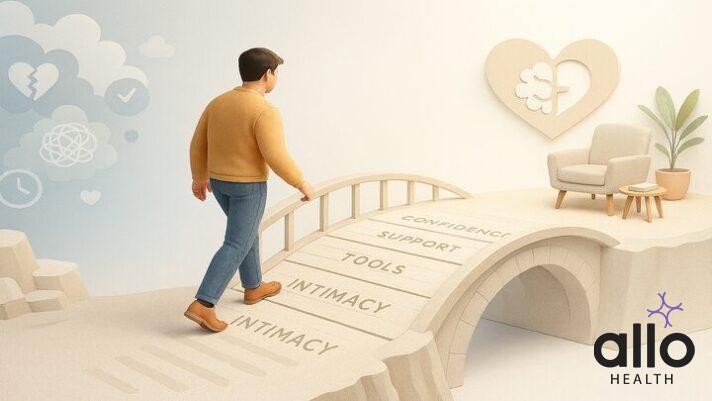
Sex therapy for erectile dysfunction is a proven, non-invasive treatment that targets the psychological and emotional causes of ED, such as performance anxiety, stress, low self-esteem, and relationship issues. It involves talk-based techniques like cognitive-behavioral therapy, mindfulness, sensate focus, and couples communication exercises- all designed to reduce anxiety and improve sexual confidence. Research shows that combining sex therapy with medication, lifestyle changes, or medical devices leads to better and more lasting results than relying on any one treatment alone.
Sex therapy for erectile dysfunction is a powerful yet often underused approach that helps men overcome the emotional and psychological barriers behind ED.
If you’re dealing with performance anxiety, relationship stress, or feel like pills alone aren’t solving the issue, you’re not alone, and you’re not without options.
In this article, you’ll learn what sex therapy really involves, how it works alongside other treatments, and why it can be a game-changer for men seeking long-term, satisfying sexual health.
What Is Sex Therapy?
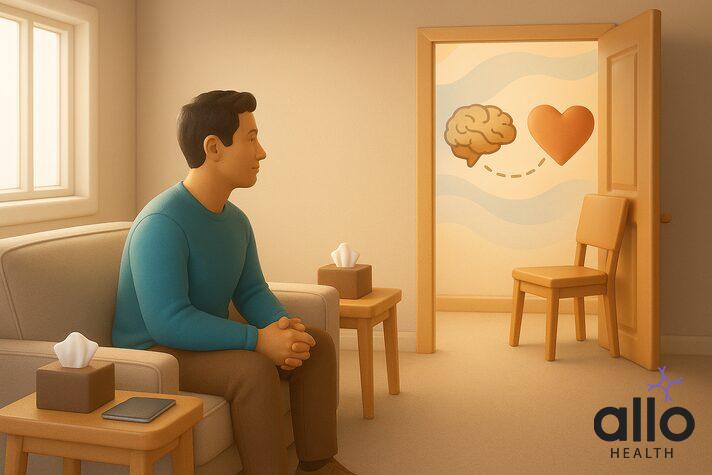
Sex therapy is a form of counseling that helps individuals or couples work through sex-related concerns.
It’s usually a short-term therapy guided by a licensed sex therapist, and it’s designed to address challenges like sexual dysfunctions, performance anxiety, relationship problems, and difficulties around sexual communication with your sexual partner.
Rather than focusing on physical causes like high blood pressure, sex therapy often explores the emotional, psychological, and relational aspects of sexual health.
Whether it’s stress, low self-esteem, past experiences, or relationship strain, these sessions aim to understand the root causes and help you manage them.
It’s also a supportive space to cope with the mental health effects of erectile dysfunction and the impact it may have on your relationship.
Does Sex Therapy Actually Work for ED?
Erectile dysfunction is complicated. The causes can involve blood flow(blood vessel)issues, nervous system problems, hormones, or psychological factors, and often, it’s a combination of several things.
But here’s what many people don’t realize: the psychological aspect of ED(psychogenic erectile dysfunction)is frequently overlooked, even though it plays a huge role.
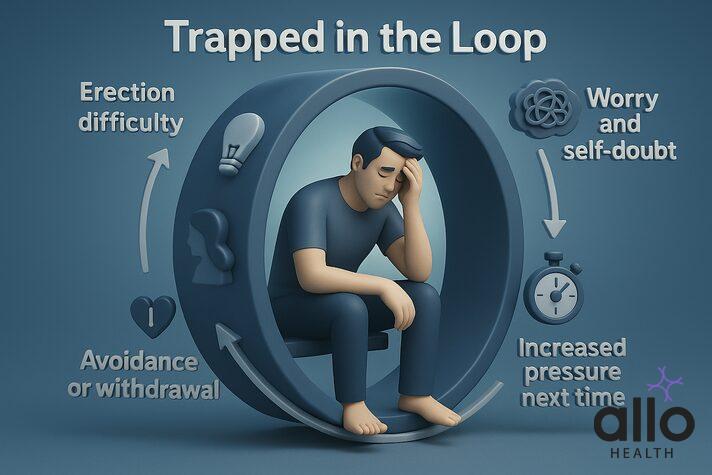
When we talk about psychological erectile dysfunction, we mean difficulty getting or maintaining an erection due to factors like depression, stress, performance anxiety, or relationship conflicts.
Here’s where it gets tricky, even when there’s a physical cause, the psychological impact can create what we call a “vicious cycle.” You have trouble once, you worry about it happening again, that worry makes it more likely to happen, and suddenly you’re stuck in a pattern of avoidance and distress.
But here’s the good news: research[1] shows that combining sex therapy or couples interventions with ED medications improves outcomes more than pills alone.
Studies[2] measuring erectile function scores consistently show better results when therapy is added to the mix.
Even better, the psychological skills you learn in therapy, like managing anxiety and developing realistic expectations, help reduce the chances of problems returning if you ever stop taking medication.
Sex therapy doesn’t involve anything physical during sessions- it’s just a safe space to explore what’s getting in the way of healthy, satisfying sex.
How Sex Therapy Tackles ED
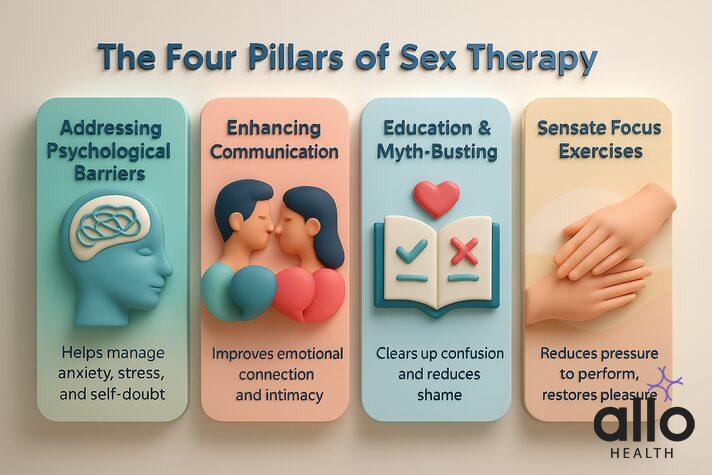
Sex therapists use several proven approaches to help break that cycle and get you back on track:
Addressing Psychological Barriers
Your therapist will help you unpack the emotions, fears, and anxieties that might be contributing to your ED.
This often involves learning to recognize and change those unhelpful thought patterns about sexual performance.
You know, thoughts like “I must stay hard the entire time” or “If I lose my erection, I’m a failure.” These thoughts are more common than you think, and they’re also totally workable.
Enhancing Communication
If you’re in a relationship, sex therapy(couples communication techniques) provides a safe space to talk openly about sexual needs and preferences.
It helps break down those walls of embarrassment or shame that might have built up over time.
When communication improves, so does partner satisfaction, intimacy, and relationship quality, and all of these actually help with erectile recovery.
Education and Myth-Busting
Sex therapists provide accurate, realistic information about how things work, which is crucial for overcoming psychological hurdles.
Sometimes, just understanding what’s normal can be incredibly relieving.
Sensate Focus Exercises
These are specific exercises designed to rebuild intimacy and reduce performance anxiety. They involve starting with non-sexual touching and gradually progressing to sexual touch, helping you rebuild sexual confidence and connection without the pressure to perform.
What Happens in Sex Therapy
Sex therapists use a variety of evidence-based treatments, but most sessions revolve around talk therapy, building a therapeutic relationship where you can explore your feelings, thoughts, and behaviors in a safe environment.
Here’s what different approaches might look like:
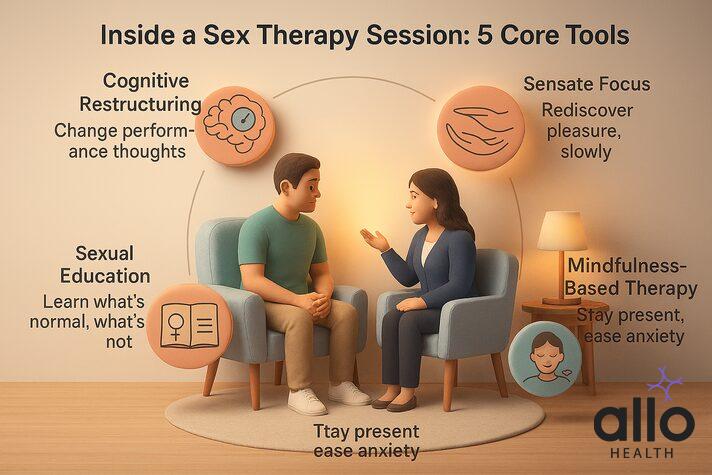
Cognitive Behavior Sex Therapy (CBT)(Cognitive Restructuring):
You’ll work on identifying and challenging those catastrophic thoughts about performance. Instead of “I must stay hard the entire time,” you might learn to think, “Sexual intimacy has many forms, and they’re all valid.”[3]
Sensate Focus:
Sensate focus involves structured touching exercises that you and your partner do at home. You start with non-genital touching, focusing on sensation and connection rather than arousal. It’s about shifting your attention away from performance and back to pleasure and intimacy.
Mindfulness-based interventions:
These mindfulness-based sex therapies help you stay present during intimate moments instead of getting caught up in anxious thoughts about performance. Think of breathing exercises and learning to notice sensations without judgment.
Couples’ communication techniques:
For couples, this couples therapy[4] involves learning to express desires assertively, resolve conflicts, and even schedule intimacy.
Psychosexual Education:
Learning about the sexual response cycle, how stress affects your body, and how erectile dysfunction interacts with overall men’s health.
Pros and Cons of Sex Therapy for Erectile Dysfunction
| Advantages | Limitations |
|---|---|
|
Non-invasive and completely reversible |
Requires regular attendance and active participation (yes, there’s homework) |
|
Helps reduce anxiety and depression, improving overall mental health |
20-40% dropout rate in some programs- it may not suit everyone |
|
Enhances relationship satisfaction and encourages open communication |
Therapist quality can vary; training and experience matter |
|
Great option for men who can’t or prefer not to take medication |
Insurance coverage is inconsistent; out-of-pocket costs can be high |
When Should You Consider Sex Therapy for ED?
- You’ve tried medication, but it’s not giving you the full picture
- Anxiety or stress seems to be a major factor in your ED
- Your relationship is suffering due to sexual difficulties
- You want to understand and address the psychological aspects of your condition
- You’re dealing with performance anxiety that seems to be making things worse
Quick Checklist: Finding the Right Sex Therapist
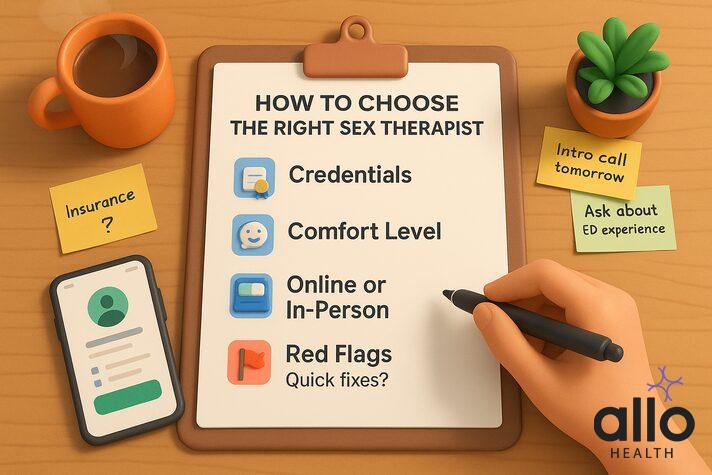
That first message or call is the hardest step- after that, you’re already on your way to better support and sexual health. You deserve care that works for you.
What to Look For
- Credentials: Look for AASECT-certified therapists (globally)[5] or those registered with IACP or RCI (India). They should be licensed mental health professionals with training in sex therapy.
- Experience: Ask if they’ve worked specifically with erectile dysfunction, especially if you have related health issues.
- Comfort & Communication: You should feel heard, respected, and at ease. Many therapists offer free intro calls – trust your instincts.
Online vs In-Person Therapy
- In-Person: Ideal for deep emotional work or couple sessions.
- Online: Private, convenient, and often just as effective, especially for discussing sensitive topics.
Key Questions to Ask
- Have you treated ED psychosexual counselling before?
- Do you work with individuals or couples?
- What’s your approach to sex therapy, intimacy issues, and timeline?
- Do you coordinate with the medical center?
- What are your fees and insurance policies?
Where to Look for a Sex Therapist
- Indian Platforms: Allo health, Manastha, BetterLYF, Wysa, Practo (look for specialized sexual health counselors)
- International: BetterHelp, Talkspace, MDLIVE (many have therapists familiar with Indian cultural contexts)
- Local Options: Major hospitals, university counseling centers, or ask your primary care doctor for referrals
- Cost Expectations: In India, expect ₹3,000-8,000 per session for private practice, ₹1,500-4,000 through platforms, and some sliding scale options available.
Red Flags in Sexual Health Professionals
- No license or proper training
- Avoids sexual topics or guarantees quick fixes
- Pushes one-size-fits-all treatments
- Unclear boundaries or discomfort
Sex Therapy and Other Treatments
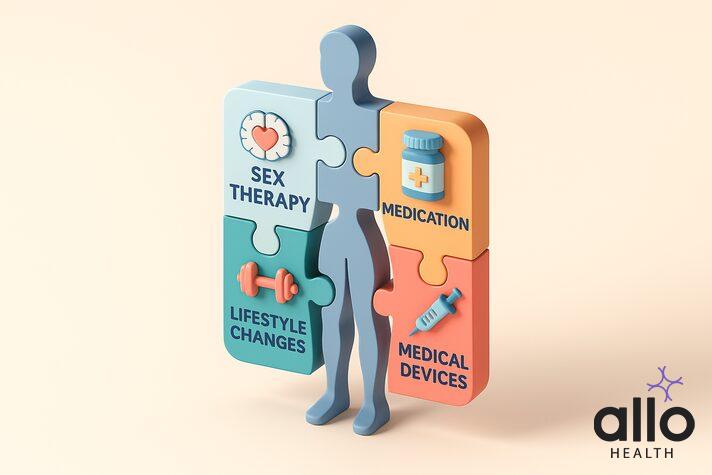
Sex therapy isn’t meant to replace other ED treatments- it’s designed to work alongside them. Think of it as building a complete toolkit, not relying on a single fix.
Why It Works
Erectile dysfunction often involves both physical and emotional factors. While medications help the body, therapy supports the mind, addressing anxiety, relationship strain, and confidence. Tackling both sides leads to better, longer-lasting outcomes.
Sex Therapy + Medication
- Effective Combination: Phosphodiesterase-5 inhibitors like Viagra or Cialis, paired with therapy, often lead to stronger results.
- How They Work Together: Medication helps physical function, whereas therapy eases anxiety and unhelpful thought patterns.
- Long-Term Benefit: Men who combine both are less likely to relapse when stopping medication.
Sex Therapy + Lifestyle Changes
- This includes exercise(like pelvic floor exercise), diet, stress management, sleep improvement, and reducing smoking or alcohol.
- A healthier body supports better blood flow and hormone balance. Therapy helps with motivation and emotional support.
Sex Therapy + Medical Devices
- Vacuum Devices: Therapy helps normalize their use and makes integration into sex life feel more natural.
- Penile Injections: Therapy reduces anxiety around self-injection and helps maintain intimacy.
- Penile implants: Sex therapy helps in getting adjusted to the prosthesis and helps sex feel more natural.
You don’t have to choose one treatment over another. Combining sex therapy with medical care, lifestyle changes, or couples work gives you a stronger, more holistic path to recovery and better sexual well-being.
The Path Forward
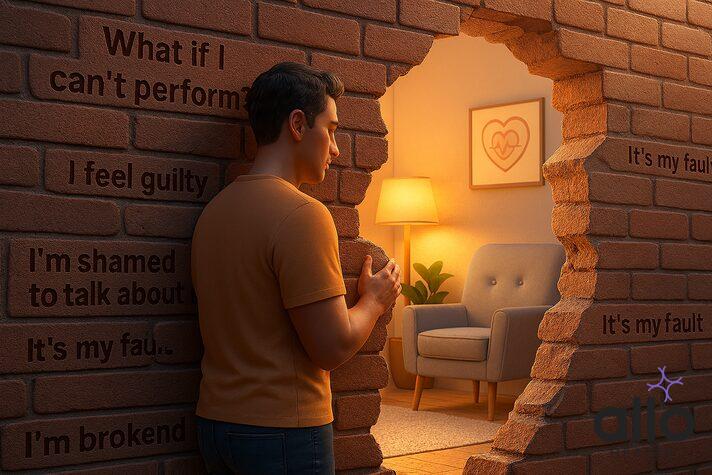
Success in sex therapy isn’t just about getting or maintaining an erection. It’s about rebuilding confidence, reducing anxiety, improving communication, and developing a healthier, more positive relationship with your sexuality.
It’s about stepping out of the cycle of stress and avoidance and back into a space where intimacy feels natural, safe, and enjoyable.
Taking that first step to reach out to a therapist can feel intimidating, but remember: sex therapists are trained professionals.
They’ve heard it all, and their role is to support, not judge. You’re not alone in this, and with the right help, progress is not only possible, it’s likely.
"The following blog article provides general information and insights on various topics. However, it is important to note that the information presented is not intended as professional advice in any specific field or area. The content of this blog is for general educational and informational purposes only.
Book consultation
The content should not be interpreted as endorsement, recommendation, or guarantee of any product, service, or information mentioned. Readers are solely responsible for the decisions and actions they take based on the information provided in this blog. It is essential to exercise individual judgment, critical thinking, and personal responsibility when applying or implementing any information or suggestions discussed in the blog."






